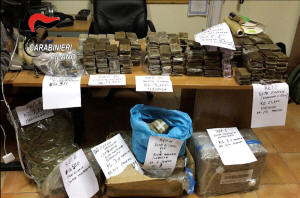Italian drugs cartels conceal payments via Chinese shadow banks
 Send a link to a friend
Send a link to a friend
 [April 06, 2023]
By Emilio Parodi [April 06, 2023]
By Emilio Parodi
MILAN (Reuters) - Drugs cartels operating in Italy are increasingly
using shadow networks of unlicensed Chinese money brokers to conceal
cross-border payments, according to Italian judicial and law enforcement
authorities.
The development highlights how an issue that U.S. authorities have been
battling in connection to Latin American narcotics groups has taken root
in Europe.
In Italy, authorities are seeing an increased use of the money transfer
networks, which operate without an easily traceable trail and facilitate
rapid payments, seven judicial and law enforcement officials told
Reuters. The transfer method involves depositing a sum with a money
broker in one country while another agent in the network elsewhere in
the world pays the equivalent amount to the intended recipient.
"The phenomenon is on the rise," said Italy’s national anti-mafia
prosecutor, Barbara Sargenti, who coordinates investigations both
domestically and abroad. In an interview at her office in Rome, Sargenti
said the growing number of related investigations was due both to an
increase in activity and an improved ability by authorities to detect
such cases.
She added that because money is transferred outside of the banking
system it makes it very difficult for authorities to identify and trace.
"This kind of financial intermediation undermines the entire
international anti-money laundering system,” which is based on the
control and analysis of banking transactions, she said. Such measures
are a key weapon in the fight against criminal gangs.

Italian authorities have announced at least six investigations involving
drug gangs and the Chinese payment networks since the issue first
publicly came to light about five years ago. Those probes involve
alleged payments to narcotics suppliers in Latin America, Morocco and
Spain, according to authorities and judicial documents reviewed by
Reuters.
U.S. authorities have said Chinese “money brokers” represent one of the
most worrisome new threats in their war on drugs, as a Reuters
investigation in 2020 found. Earlier this year, the head of the U.S.
Drug Enforcement Administration Anne Milgram highlighted the issue
during a Senate committee hearing, saying Mexican drug cartels were
using Chinese money laundering organisations “around the world to
facilitate laundering drug proceeds.”
It has become an issue for law enforcement in Europe, too. Europol, the
European Union’s police agency, told Reuters that Chinese criminal
networks are “more and more engaged in the laundering of criminal
proceeds in Europe,” including from drug trafficking.
The seven people said money transfers are part of a broader array of
services offered by Chinese-linked organisations, including facilitating
tax evasion, in what Italian authorities refer to as an “underground”
banking system.
One of the people said there were about a dozen additional
investigations underway involving money transfers or other illicit
activity connected to Chinese organisations that haven’t been made
public. The person, who has direct knowledge of those probes, estimated
tens of billions of euros each year were being moved out of Italy via
the underground system.

Chinese authorities have previously vowed to crackdown on underground
banking.
Asked if China was aware of the movement of large amounts of money via
unlicensed Chinese money brokers in Italy, including by drug gangs, or
whether it was helping Italy to tackle it, the Chinese foreign ministry
spokesperson's office said in a statement: “I am not aware of the
circumstances you mentioned.”
FLYING MONEY
The money transfers are based on a long-established informal payment
system, often referred to by the Chinese term fei qian or fei chien,
meaning flying money, which relies on a trusted network of transfer
agents.
It is not necessarily illegal to transfer funds via friends and family
to pass cash to creditors on your behalf. But it is illegal in Italy to
provide banking services without authorization and to launder the
proceeds of crime.
One of the first probes to come to light involving use of Chinese money
brokers by Italian mobsters was linked to the Calabrian ‘Ndrangheta
group, one of the largest crime gangs in the world. The investigation
resulted in the 2018 arrest of 90 people in Italy and elsewhere in
Europe, and the seizure of 4 tonnes of cocaine worth an estimated 240
million euros ($261.96 million).

Among ongoing investigations is one that led to the arrest last November
of more than 40 people in Italy and Spain for suspected drug
trafficking. That includes a former army officer and senior figure in
the Italian Referees’ Association, called Rosario D'Onofrio, who police
allege served as a logistics chief for a drugs gang.
[to top of second column]
|

Seized drugs are seen following an
investigation on drugs cartels operating in Italy increasingly using
shadow networks of unlicensed Chinese money brokers to launder their
proceeds in this handout photo obtained by Reuters on April 4, 2023.
Carabinieri/Handout via REUTERS

According to an October 2022 arrest warrant, D’Onofrio paid 180,000
euros to a Chinese intermediary during a March 2020 visit to Milan’s
Chinatown to pay suppliers in Spain for a shipment of hashish. The
intermediary sent a text message to a counterpart in Spain to hand
over a corresponding sum to the suppliers and charged D’Onofrio
2,700 euros in commission - the equivalent of 1.5% - for the
transaction, the arrest warrant detailed.
D’Onofrio is currently in detention; his lawyer Niccolò Vecchioni
declined to comment. The Chinese intermediary has not been
identified.
SUITCASES OF CASH
In a separate investigation, which resulted in the seizure of 720
kilograms of drugs and millions of euros in cash, police tracked a
man who crisscrossed Italy collecting money as payment for large
quantities of narcotics sent from Morocco, according to an October
2021 arrest warrant. The money was delivered to Chinese businesses
in Tuscany and Rome, where transfers were made to drug suppliers via
“Chinese correspondents” in the north African country, authorities
allege in the documents.
Authorities arrested eight people on suspicion of drug trafficking
and money laundering in connection with the investigation.
The probe also revealed what happened to at least some of the
physical cash collected: it was packed into suitcases and given to
Chinese nationals flying to Hong Kong, said Major Michele Maselli, a
senior officer in the Milan Carabinieri police.
Between 2.5 million euros and 4 million euros were shipped out of
Rome’s Fiumicino airport each week from October 2019 to October
2021, according to the Carabinieri.

The Chinese businesses in Tuscany and Rome were part of the
underground banking network, according to the 2021 arrest warrant.
Authorities asked not to identify the businesses because a probe
into the cash transfers to Hong Kong, and their ultimate
destination, is ongoing.
UNDERGROUND BANKING
Money brokers are part of large Chinese diasporas in places like
Europe, the United States and Latin America. The brokers help
affluent Chinese looking to move wealth abroad to evade China’s
currency controls, Western law enforcement says. Beijing limits the
amount of money its citizens can transfer out of China to the
equivalent of $50,000 U.S. dollars annually.
As a result, Chinese nationals use informal exchanges that involve
transferring currency electronically in China and the equivalent
amount is provided to someone overseas in cash to be deposited into
a bank account. Criminal groups, flush with euros from activity such
as drug sales, can help satisfy the demand for hard currency.
“Upstream of this clandestine banking activity there is a huge
availability of liquidity of these Chinese groups all over the
world,” said Francesco Pinto, a deputy chief prosecutor in Genoa.
In Italy there is a debate among authorities about whether there is
a single vast Chinese-linked operation with myriad, interconnected
branches, or numerous separate organisations that work independently
of each other, according to three of the seven people Reuters spoke
to.

All seven, however, said money laundering was just one of the
illicit services offered. There is a “parallel banking system” that
has customers of various kinds “from tax evaders to drug
traffickers,” said Laura Pedio, a deputy chief prosecutor in Milan.
Last month, Milan prosecutors announced the arrest of 22 people and
the seizure of 292 million euros following a probe into tax evasion
that allegedly involved some Chinese middlemen in Italy.
Official wire transfers between Italy and China have shrunk over the
past decade, which one senior investigator said suggested that the
Chinese community in Italy had reduced their use of the official
banking system. According to Bank of Italy data, remittances from
Italy to China totalled 22 million euros in 2021, down from a high
of 2.67 billion euros in 2012.
Italy’s finance police last year set up a special unit to monitor
the underground banking system. And, the new Italian government has
asked the country’s anti-mafia commission, which is made up of
politicians, for the first time to probe “the Chinese infiltration
in Italian society.”
($1 = 0.9162 euros)
(Writing by Crispian Balmer. Additional reporting in Beijing by
Laurie Chen. Editing by Cassell Bryan-Low)
[© 2023 Thomson Reuters. All rights
reserved.]This material may not be published,
broadcast, rewritten or redistributed.
Thompson Reuters is solely responsible for this content. |